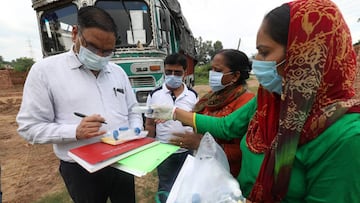Covid-19 sets back malaria, HIV and tuberculosis fight by years
The lack of resources currently available for these three diseases due to the coronavirus pandemic could have devastating effects warns the WHO.

The Covid-19 pandemic has resulted in over 23 million infections worldwide and caused more than 800,000 deaths according to Johns Hopkins University figures, but health experts are now warning the novel coronavirus could have devastating secondary effects on diseases that were previously considered controllable, including tuberculosis, malaria and HIV/AIDS.
Covid-19 knock-on effects could erase years of progress
Nearly two-thirds of @GlobalFund-supported malaria programs have been impacted by #COVID19. But this is a fight we can win. We have the tools and treatments to prevent and cure malaria. With unwavering commitment we can #EndMalaria and #SaveLives. #UniteToFight. #WorldMosquitoDay pic.twitter.com/6XfdqrONvH
— The Global Fund (@GlobalFund) August 20, 2020
According to a study be The Lancet, fatalities caused by HIV/AIDS, tuberculosis and malaria could increase by 10 percent, 20 percent and 36 percent respectively over the next five years. To put that into some context, according an article on pandemics in August’s National Geographic Magazine, tuberculosis was the cause of 1.5 million deaths in 2018 while HIV/AIDS kills 770,000 people every year.
The Lancet published a report in June suggesting that the cost of staging an effective response to the Covid-19 pandemic and preventing "a potentially devasting impact on HIV, tuberculosis, and malaria in the highest-burden countries" stands at $28.5 billion.
Meanwhile The Global Fund to Fight AIDS, Tuberculosis and Malaria reports that 85% of HIV, 78% of tuberculosis, and 73% of malaria programmes are being disrupted by advance of the novel coronavirus in the 100 countries to which it provides funding, which the Lancet report notes could have a more damaging impact in those countries than Covid-19 itself.
Alexandra Hogan, the lead author, and colleagues reached the conclusion that deaths caused by HIV/AIDS, tuberculosis and malaria could increase as a result of the disruption of global health programmes to combat the diseases due to “interruption of antiretroviral treatment for HIV, disruption of timely diagnosis and treatment of new cases for tuberculosis, and curtailment of mosquito net distribution for malaria.”
Global Fund budget to run out in September
"Mounting an effective global response to covid-19 will require unprecedented levels of collaboration, innovation and money." -@GlobalFund's @PeterASands https://t.co/EkPEhOCxqT
— Friends of the GF (@theglobalfight) August 24, 2020
Related stories
Tereza Kasaeva, Director of the World Health Organization Global Tuberculosis Programme, painted a stark picture of the situation. “Between 50 percent and 75 percent of tuberculosis programmes and treatments globally have been interrupted up to now, depending on the country and the levels of hospital care, supplies and tests. Right now, $3 billion is needed to return to the pre-Covid situation, but that figure could double or triple if the trend continues in this way. It’s very worrying.”
The Global Fund has allocated $1 billion to those countries most in need during the coronavirus pandemic, but the organization has warned that these emergency funds will have run out by the end of September.

